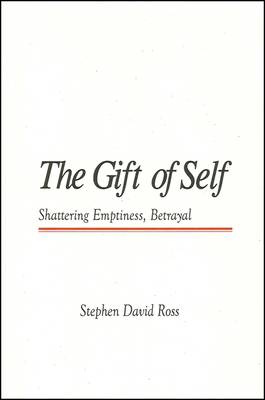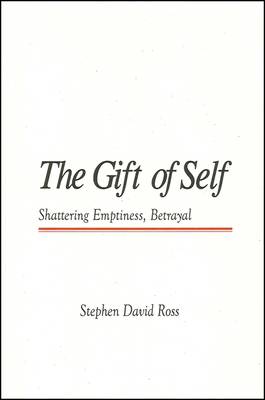
Vous voulez être sûr que vos cadeaux seront sous le sapin de Noël à temps? Nos magasins vous accueillent à bras ouverts. La plupart de nos magasins sont ouverts également les dimanches, vous pouvez vérifier les heures d'ouvertures sur notre site.
- Retrait gratuit dans votre magasin Club
- 7.000.000 titres dans notre catalogue
- Payer en toute sécurité
- Toujours un magasin près de chez vous
Vous voulez être sûr que vos cadeaux seront sous le sapin de Noël à temps? Nos magasins vous accueillent à bras ouverts. La plupart de nos magasins sont ouverts également les dimanches, vous pouvez vérifier les heures d'ouvertures sur notre site.
- Retrait gratuit dans votre magasin Club
- 7.000.0000 titres dans notre catalogue
- Payer en toute sécurité
- Toujours un magasin près de chez vous
53,45 €
+ 106 points
Description
In this book Stephen David Ross explores themes of dispossession, shattering, and fragmentation that arise in contemporary writings from the point of view of the selves whose subjectivities and practices are said to be fragmented, shattered, and dispossessed. He thereby addresses the question of what it might mean to be a poststructuralist, postmodern, post-enlightenment, post-religious, postcolonial, or post-capitalist self (if there be such) in the context of worldwide changes in thought and practice that have occurred in the interstices of global developments and local traditions. One of his major concerns is with a self in the world with relations that surpass relations with other human beings, an ethical, caring, relational self that inhabits the earth with other creatures and things, a self with ecological relations. Ross argues that ethical, political, social, religious, and ecological concerns cannot be separated from the images, representations, and discourses that frame the contemporary world, that a self must relate to itself and others in aesthetic, mimetic, imagistic terms if it is to address questions of identity, identification, and responsibility; moreover that such images, identifications, and representations are, in Derrida's words, not only human, that they disrupt the categories of humanity and nature. In this way, boundaries that separate selves from others, humans from nature, finite from infinite, present themselves for crossing and double crossing.
The book continues the themes of giving, generosity, betrayal, forgiveness, responsibility, relationality, and the good developed in his previous writings, especially the five volumes of the gift series (The Gift of Beauty: The Good as Art; The Gift of Truth: Gathering the Good; The Gift of Touch: Embodying the Good; The Gift of Kinds: The Good in Abundance, an ethic of the earth; The Gift of Property: Having the Good, betraying genitivity, economy, and ecology, an ethic of the earth) and the three immediately preceding volumes (The Ring of Representation; Injustice and Restitution: The Ordinance of Time; Plenishment in the Earth: An Ethic of Inclusion). Ross explores these themes here in relation to the possibilities of life for a self among others in the world.
The book proceeds from the themes of care of self and technologies of self developed in Foucault's later writings, preceded by an examination of the notion of sôphrosunê in Plato's Charmides. These themes are framed from the beginning by Derrida's writings on responsibility--its impossibilities, temptations, and excesses--and by Levinas's insistence that the self, the ego, is composed by relations toward the other, in alterity. It is not I who decides to accept my responsibilities toward my neighbor but those responsibilities determine who and what I am. The self is not constituted by what it has or possesses but by generosity beyond itself. In this double sense, from Levinas and Derrida, the self is constituted by relations with others that exceed any categories and measures. This excess of relation and expression pervades all things.
The major themes of the book are named in the chapter titles (slightly amended): I myself, self knowledge, self care, self identity, self image, self love, self possession, self and others, self and world, shattering, emptiness, responsiveness, self betrayal. Betrayal is taken from Levinas as exposition--exposure and expression--reworked in relation to Derrida as performativity and responsibility. It strongly retains its double meaning as violation and revelation. Generosity and forgiveness are situated in the space where the self betrays itself.
Authors discussed at length are Plato, Nietzsche, Levinas, Derrida, Foucault, Freud (together with Erikson and Lacan), Blanchot, Nancy, and Irigaray, with extended references to Spinoza, Heidegger, Sartre, Beauvoir, and Deleuze and Guattari. Throughout, Ross discusses writings that pertain to other cultures--African and Asian--to further complicate the discussions.
A long chapter is devoted to Buddhist themes of emptiness, nonattachment, and nonself in relation to the shattering, fragmentation, and dispossession of the modern self, exploring how Buddhism and other Asian texts and practices may define a different multiple, relational sense of self in some of the countries in which they have become socially widespread. This discussion concerns itself in part with ways in which continental writings on self and other retain a European, Christian, and Enlightenment attachment to individuals, persons, and selves. In return, however, the discussion also examines how Buddhist and other views of self that may have in some respects achieved a far greater multiplicity and relationality than European views become captive to social and political developments that frequently appear incompatible with their central tenets
The author's hope is that the social-ethical-political critique that emerges from post-enlightenment critiques of modernity can be brought into relation with themes of emptiness and nonattachment in productive ways. His goal is to open up discussions of self and world that move beyond the boundaries that have framed them historically.
The book continues the themes of giving, generosity, betrayal, forgiveness, responsibility, relationality, and the good developed in his previous writings, especially the five volumes of the gift series (The Gift of Beauty: The Good as Art; The Gift of Truth: Gathering the Good; The Gift of Touch: Embodying the Good; The Gift of Kinds: The Good in Abundance, an ethic of the earth; The Gift of Property: Having the Good, betraying genitivity, economy, and ecology, an ethic of the earth) and the three immediately preceding volumes (The Ring of Representation; Injustice and Restitution: The Ordinance of Time; Plenishment in the Earth: An Ethic of Inclusion). Ross explores these themes here in relation to the possibilities of life for a self among others in the world.
The book proceeds from the themes of care of self and technologies of self developed in Foucault's later writings, preceded by an examination of the notion of sôphrosunê in Plato's Charmides. These themes are framed from the beginning by Derrida's writings on responsibility--its impossibilities, temptations, and excesses--and by Levinas's insistence that the self, the ego, is composed by relations toward the other, in alterity. It is not I who decides to accept my responsibilities toward my neighbor but those responsibilities determine who and what I am. The self is not constituted by what it has or possesses but by generosity beyond itself. In this double sense, from Levinas and Derrida, the self is constituted by relations with others that exceed any categories and measures. This excess of relation and expression pervades all things.
The major themes of the book are named in the chapter titles (slightly amended): I myself, self knowledge, self care, self identity, self image, self love, self possession, self and others, self and world, shattering, emptiness, responsiveness, self betrayal. Betrayal is taken from Levinas as exposition--exposure and expression--reworked in relation to Derrida as performativity and responsibility. It strongly retains its double meaning as violation and revelation. Generosity and forgiveness are situated in the space where the self betrays itself.
Authors discussed at length are Plato, Nietzsche, Levinas, Derrida, Foucault, Freud (together with Erikson and Lacan), Blanchot, Nancy, and Irigaray, with extended references to Spinoza, Heidegger, Sartre, Beauvoir, and Deleuze and Guattari. Throughout, Ross discusses writings that pertain to other cultures--African and Asian--to further complicate the discussions.
A long chapter is devoted to Buddhist themes of emptiness, nonattachment, and nonself in relation to the shattering, fragmentation, and dispossession of the modern self, exploring how Buddhism and other Asian texts and practices may define a different multiple, relational sense of self in some of the countries in which they have become socially widespread. This discussion concerns itself in part with ways in which continental writings on self and other retain a European, Christian, and Enlightenment attachment to individuals, persons, and selves. In return, however, the discussion also examines how Buddhist and other views of self that may have in some respects achieved a far greater multiplicity and relationality than European views become captive to social and political developments that frequently appear incompatible with their central tenets
The author's hope is that the social-ethical-political critique that emerges from post-enlightenment critiques of modernity can be brought into relation with themes of emptiness and nonattachment in productive ways. His goal is to open up discussions of self and world that move beyond the boundaries that have framed them historically.
Spécifications
Parties prenantes
- Auteur(s) :
- Editeur:
Contenu
- Nombre de pages :
- 434
- Langue:
- Anglais
Caractéristiques
- EAN:
- 9781586840433
- Date de parution :
- 01-01-05
- Format:
- Livre broché
- Format numérique:
- Trade paperback (VS)
- Dimensions :
- 152 mm x 229 mm
- Poids :
- 698 g







